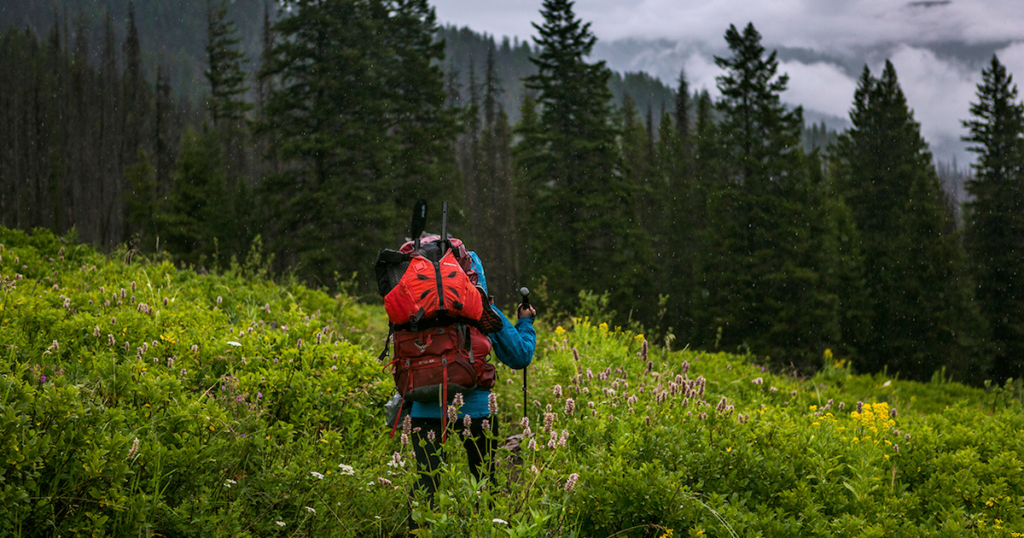The rewards of hiking and backpacking are well worth some calculated risks. But in order to make smart choices out there about how to avoid ticks while hiking, it is important to understand more about those critters. Here's the straight scoop on tick bite safety.
This season I got bitten by a tick while hiking, and because I delayed medical treatment, wound up getting incredibly sick. This could have evolved into something even more serious, and potentially life-threatening.
I want to share my experience with you, and offer up tips on how to avoid ticks while hiking. I'm not a medical professional, so please just take this as a general guide. If you suspect that you've been bitten by a tick, or exhibit any symptoms related to tick-borne diseases, seek help from a qualified healthcare practitioner.

My Scary Tick Scenario
Last spring, I was on a Montana-based adventure with my, at the time, fiancee, but now wife, Kristi, and our beloved dog Kovu. We were excited to delve deep into the Rocky Mountains – areas that had just become free of snow. Because of the recent transition out of winter, we simply weren't thinking about ticks. But nature plays by its own rules. Tick season does actually start in Montana in the early Spring, and can roll all the way through until late Fall. In fact, many states (mostly in the Western and Southern parts of the country) have year-round tick seasons.
One morning we awoke to ticks crawling all over the outside of the tent. This snapped us out of our careless reverie and into precautionary mode. We did head-to-toe tick checks but found nothing. However, several hours later, while hiking down the mountain, I felt something while scratching my back. I asked Kristi to investigate, and low and behold, she found a tick setting up shop in my skin. Because it hadn't completely embedded itself, she was able to pluck it out without much fuss. We both breathed a sigh of relief.
About three days later, I was hit with an extreme fever, body aches, and chills. But I honestly just thought I was coming down with the flu, or possibly Covid. Despite the countless miles I've logged in the backcountry, I've never dealt with tick-related issues before. And because I live in Arizona (which does have ticks, but not nearly as much brush to hide in), I'm remiss to say that my knowledge on the matter was also lacking. Hence why we're here today!

What To Do If You Feel Sick from a Tick
It took me eight days to finally make the decision to seek medical attention after getting bitten by that tick. This was a big mistake. The information I found, retroactively, encourages hikers who've encountered ticks to get tested as soon as they start feeling negative effects, and maybe even jump on antibiotics proactively (if this is in agreement with your doctor).
I did finally start a course of antibiotics, but because I waited so long to do so, it took me months to fully recover. Long after the incident, I still felt consistently tired, sluggish when I tried to go about my day, and my eyes were unusually sensitive to light. As miserable as this drawn-out episode was, I'm still lucky I didn't succumb to permanent consequences. I could have even died.
Why are Ticks Dangerous?
Those sneaky little buggers carry bacteria in their saliva that can cause diseases in humans. The most common ailment, Lyme disease, is one you've all likely heard of. But there is a surprising list of lesser-known tick-borne illnesses. I was diagnosed with something called Rickettsia, or Rickettsia parker rickettsiosis (if you want to get clinical with it), which is related to a causative agent of Rocky Mountain spotted fever (RMSF). From what I was able to ascertain, 20-30% of Rickettsia cases can indeed be fatal.
It only takes a few minutes for a latched-on tick to transmit what it might be harboring. Thankfully, if it's embedded for less than 24 hours, there is a lower risk of severe outcomes – but as I learned the hard way, still enough of a risk to cause real problems. I'm guessing that the tick that tagged me in Montana was probably only there for an hour or so.
What to do if You Find an Embedded Tick
There are some myths out there saying to cover ticks with petroleum jelly (i.e. Vaseline), or burn them off. Turns out, these are actually terrible ideas. Agitating ticks can cause them to secrete more of their disease-carrying fluids into your skin/bloodstream.
The best thing to do is to grab a clean pair of tweezers, pinch as close to the tick's head as possible, and slowly but firmly tug away from the site. While doing so, try to keep the head from breaking. Don't fret if some pieces remain embedded. Much like a splinter, those should reemerge on their own within a few days.
Warning Signs to Check for After a Tick Encounter
It is common, but not universal, for a rash or spots to develop after getting bitten by a tick. I actually didn't get this, but as I mentioned earlier, three days after my encounter, I did develop a fever, chills, and body/muscle aches, followed by general fatigue. Given the times, I suspected Covid, but my test for this came back negative.
Looking back now, it seems obvious that the tick we found caused the symptoms that developed soon after. But a combination of ignorance, life responsibilities (I was in the middle of an Epic Trails shoot when this stuff arose), and good old-fashioned denial created a barrier to necessary action. Eventually, while trying to hike a measly half-mile, my body locked up like I was 90 years old. At the time, I found this to be sort of funny, but in hindsight, alarm bells should have been going off!
So don't do what I did. If you develop any of the above symptoms, or feel unwell in any way that you suspect could be related to a tick, get to a doctor as soon as possible, get tested for tick-borne-diseases, and prepare to begin a course of antibiotics, perhaps even before receiving the results.
An Odd Fact About Lyme Disease
There are several reasons why we want to avoid Lyme disease. Arthritis, persistent aches and pains, relentless fatigue, and memory issues are some of the most common complaints. But while researching the subject, I learned that some people who contract Lyme disease can no longer eat meat. So if you love those southern barbeque joints like I do, then you had best take precautions while hiking in tick territory.
How To Avoid Ticks While Hiking
For starters, be mindful of when ticks are active in your region. I dug up this helpful diagram provided by the American Kennel Club (since ticks and fleas impact our beloved pooches too). But as a general principle, anytime you're traversing wooded, shrubby, or grassy areas in above-freezing conditions, layer up! Wear long pants and long socks, and maybe even tuck the former into the latter. You may not be the coolest looking hiker on the trail, but you'll be the best protected, as this makes it much more difficult for ticks to find an area of skin to latch onto.
Inspect Yourself Routinely for Ticks
It is also super helpful to have a hiking partner who is willing to inspect you (and, of course, be sure to return the favor). And don't be shy out there! You have to peek into all the little nooks and crannies. I'm talking groin, arm pits, buttcrack – the works! Ticks will take what they can get, but when possible, they love to seek out dark, warm, and moist places. Don't forget to check your gear either. I suspect that a tick was hiding on my backpack, and made its way under my shirt's collar while we were logging miles.

Another preventative measure you can take is to use a tick-specific bug spray. I'm a fan of Ben's Tick and Insect Repellent. Even though the mosquitoes weren't out at the time of our fateful Montana hike, I still should have used some bug spray. If you're opposed to DEET, at least consider something like Murphy's Naturals repellent, which uses lemon eucalyptus oil to stave off both mosquitoes and ticks. Click here to learn more about how to keep bugs away when camping. Spoiler alert: I am a fan of DEET.
Though I do have a newfound respect for the littlest of creatures crawling about the backcountry, I am making a firm vow to not let my negative experience spoil my love of hiking. The call of the wild is simply too great. Instead, I will deploy better judgment going forward so that this never happens again.
How to Avoid Ticks While Hiking?
I hope you can also take some of these best-practices with you on your upcoming adventures. Even though cooler temperatures have descended in most places, ticks often persist through the fall and early winter. Layer up, scan yourself for ticks, use your bug sprays or repellants, and heed any warning signs immediately.
Big Thanks to Mystery Ranch
Before we explore some tick-prevention strategies, I just wanted to give a nod to our long-time sponsor, Mystery Ranch. They not only make amazing backpacks, but they have helped support our goal of getting more people active in the great outdoors.
We've done tons of in-depth reviews on BackpackingTV and In4Adventure.com, but if you're interested in learning even more, straight from the horse's mouth, head on over to MysteryRanch.com.
For more safety tips, how-tos, and hot-off-the-press gear reviews, head on over to BackpackingTV.








